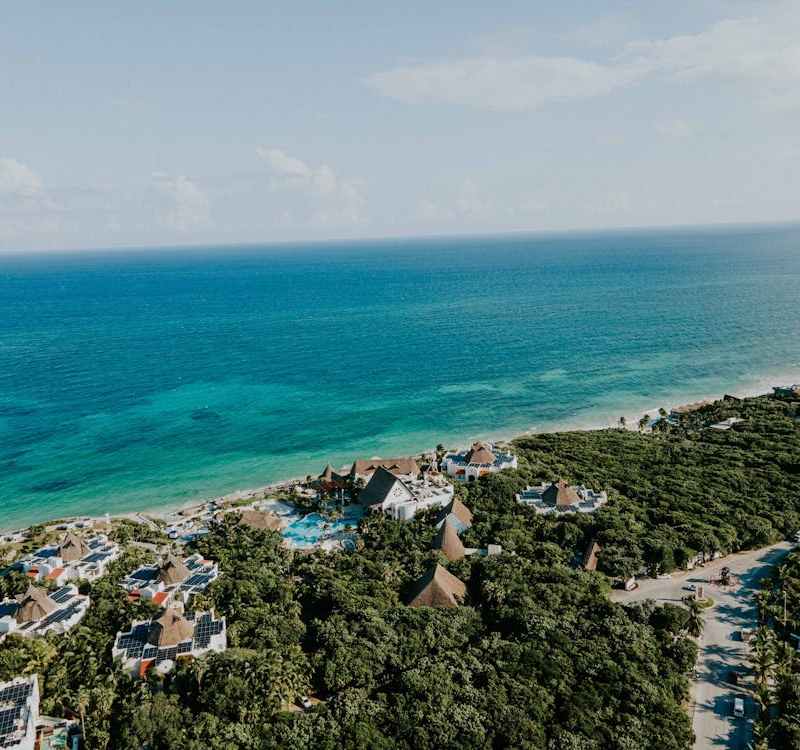
Tulum is one of the most exciting destinations on Mexico’s Riviera Maya and will make for an unforgettable beach getaway. It’s got ancient Mayan ruins, beautiful weather, baby sea turtles, and a Burning Man-esque atmosphere. What’s not to love?
Well, it’s interesting you ask. Even Tulum’s heavenly jungles and white sand beaches are subject to things like hurricane-level winds, nasty algae deposits, and melt-your-face-off heat.
Of course, nothing is perfect—but when you’re planning a trip to a tropical paradise, it’s important to focus on avoiding unwanted surprises. The more you know, the more you can prepare.
Want to learn more about the best time to visit Tulum?
I’ve done all the heavy lifting for you. Below, you’ll find a monthly breakdown of what to expect in this Mayan hotspot.
A quick note on metrics
I’ve used four metrics to evaluate the best time to visit Tulum on a month-by-month basis. These are weather, temperature, tourist numbers, and events like holidays and festivals.
For me personally, avoiding large swaths of tourists is a high priority. Give me torrential downpours, give me seaweed, give me sharks—just don’t make me listen to a wayward tourist talk about last night’s Tinder date. But you can decide for yourself which is most important to you.
The best and worst times to visit Tulum:
- Best times to visit Tulum: January through May are preferred by most tourists thanks to the weather, temperature, and number of events. I would recommend visiting Tulum in either November or May. Both are shoulder seasons in terms of tourism. They also have the best weather; not too hot and not too rainy.
- The middle ground: November and early December are popular options for those looking to avoid tourists, like me.
- Worst times to visit Tulum: Then we have June through October, considered the worst months to visit due to heavy rain, sticky heat, and tides of sargassum seaweed. I’d avoid visiting October, in particular, as it’s the height of the rainy season, which also intersects with hurricane activity. Yikes.
Best Time to visit Tulum
January – May

January
- Average temperature: 69 – 82°F
- Average rain: 5.3 inches, 7 rainy days avg.
- Tourism: Peak tourist season (seriously—it never gets busier in Tulum)
- Popular events, holidays, & activities
- Zamna Tulum Festival (Tulum). If you’ve seen visuals of smoke pouring from a massive, sculpted head as revelers dance in the jungle, it’s probably from one of Zamna‘s music festivals. Since 2017, this club has hosted a hugely popular, multi-week event in Tulum.
- Day Zero Festival (Tulum). Day Zero is an 18-hour dance festival that takes place in wilderness surrounding Tulum. It focuses heavily on a ‘jungle vibe’, which I’m guessing means an emphasis on visuals and sculptures that are integrated into nature.
January marks the peak travel month in Tulum. The warm weather isn’t scorching, which means you can lounge in the sun all you like. It’s also one of the best times to visit if you want to dance your heart out.
Two of Tulum’s flashiest and most well-known festivals take place during January, including Zamna Festival and Day Zero. That being said, you’ll feel the presence of tens of thousands of tourists as they flock to Tulum town and neighboring areas.
If you’re a social butterfly, it’s the perfect scene to spread your wings and make lasting connections. But beware of the trade-offs.
Along with packed beach clubs and pricier hotels, you’ll also face long lines when heading to Tulum ruins and other archaeological hotspots. Oh, and prepare for short rain showers—January gets over five inches of rain despite being part of Tulum’s dry season.

February
- Average temperature: 68 – 83°F
- Average rain: 1.8 inches, 5 rainy days avg.
- Tourism: Peak season
- Popular events, holidays, & activities: n/a
February is the height of Tulum’s dry season. It’s also the coolest month to visit, as temperatures drop during this time. That makes it a great option for those who want to avoid cloudy weather… or getting too red-faced in front of their new boo at Sian Ka’an Reserve or Chichen Itza.
In fact, you might even get a bit chilly when swimming in the local cenotes. These tend to be cooler than the beach or jungle outside.
Despite the good weather, you’ll still be contending with hordes of tourists. Once more, this isn’t a bad thing if you like to see and be seen; Tulum is full of sexy people doing trendy things. Just be prepared to wait in a few lines and to pay high prices at hotels, restaurants, and on tours.
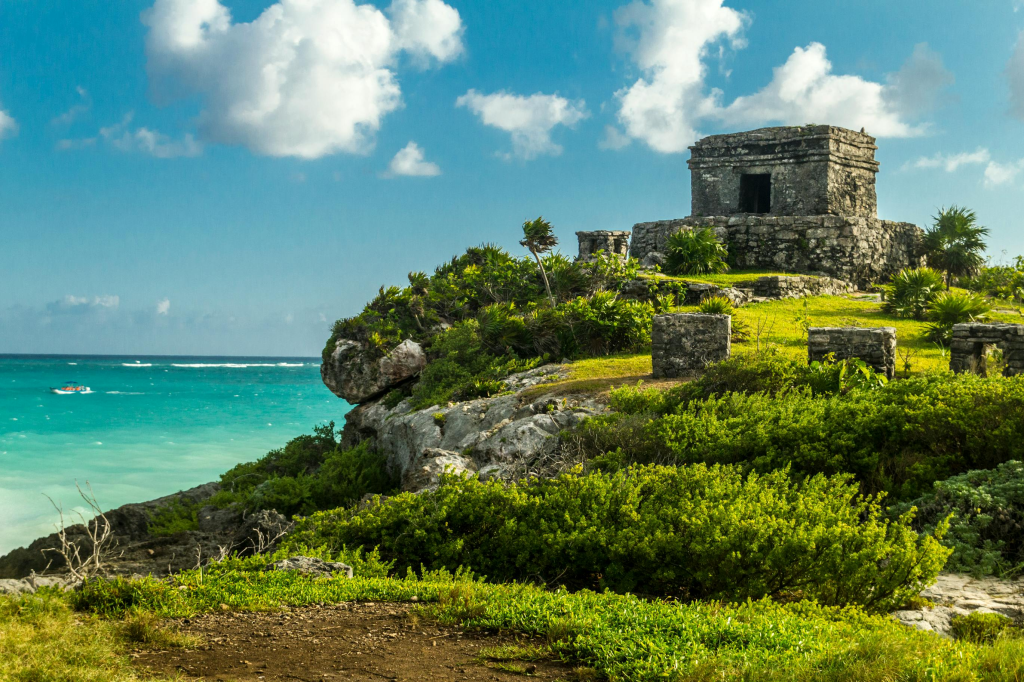
March
- Average temperature: 70 – 85°F
- Average rain: 2.07 inches, 3.5 rainy days avg.
- Tourism: Peak season
- Popular events, holidays, & activities
- LOCUS Festival (Tulum). Billed as a drum’n bass ‘experience’, this festival brings on some of the leading names in drum’n bass music. Best of all, LOCUS Festival takes place at four different venues around Tulum, letting you explore the town’s party vibe. I would be here in a flash.
March is the sunniest month in Tulum, offering almost endlessly clear skies. Though temperatures are hiking up, you won’t be boiled on your towel at the beach. Once again, this makes March ideal for those who want to focus on outdoor activities during their visit.
Remember, although Tulum is known for its stunning beach views and warm weather, there’s plenty to do aside from sit in the sand. From ziplining through the jungle to exploring protected bio reserves, you can spend day after day in the great outdoors.
But do enjoy the beach. March also marks the last month before the start of sargassum season. We’ll cover this below—just know that March is the last month that you’re guaranteed to not run into this type of brown seaweed on Tulum’s shores.
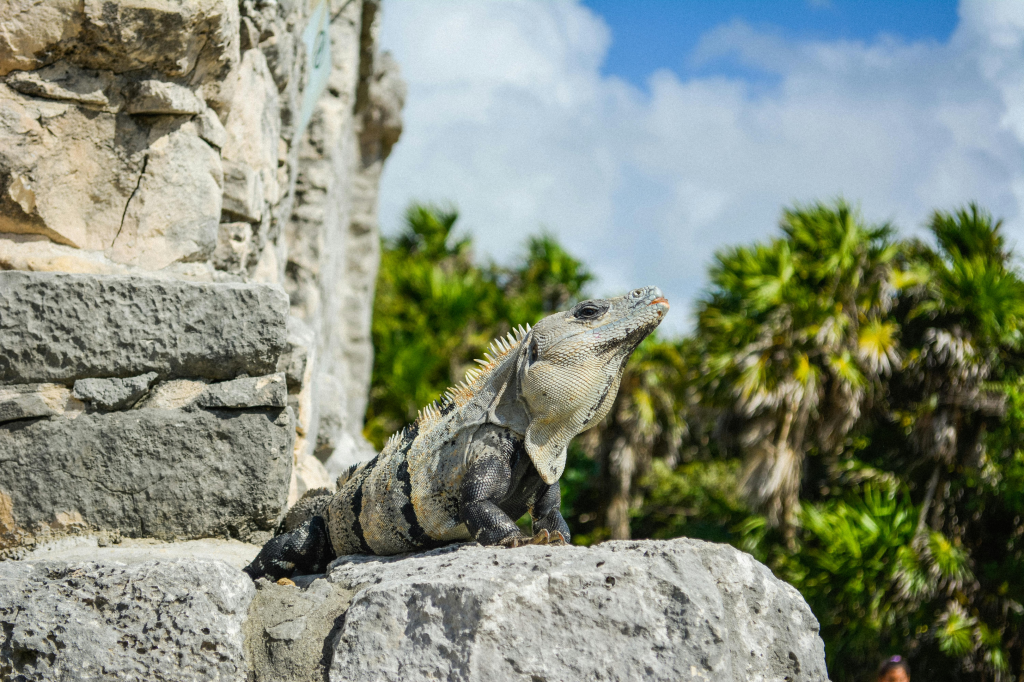
April
- Average temperature: 74 – 88°F
- Average rain: 1.5 inches, 3 rainy days avg.
- Tourism: Peak season
- Popular events, holidays, & activities
- Holy Week (aka Semana Santa). Mexico is a largely Catholic country. In April, you might spot a few cultural festivities during Semana Santa, from extended church services to solemn parades commemorating the stages of the cross. Observe respectfully.
‘Tis the season of Spring Break in Tulum. Similar to March, April has just as many sunny days with little rainfall. Think: sunshine and clear skies for days on end… and plenty of rowdy groups enjoying the beach.
As outlined above, April is the start of seaweed season, aka sargassum. Sargassum is a type of algae that drifts across the Atlantic like a pile of brown doom. Don’t worry—it’s good for the environment, providing food and shelter to some of the ocean’s coolest creatures.
But it’s bad for your beach time, as the clumps of seaweed are unsightly and stinky.
So, what happens if you schedule a trip during sargassum season (April – July)? Don’t worry. Sargassum has been a common beach deposit for well over a decade. Hotels across Mexico’s Riviera Maya are ready to clean beaches at lightning speed.
On top of that, it’s rare that every beach in Tulum or the surrounding areas be affected at the same time. In other words, you can always seek out a sargassum-free beach—and you should be able to find one relatively close by.

May
- Average temperature: 75 – 90°F
- Average rain: 3.5 inches, 7 rainy days avg.
- Tourism: Mid
- Popular events, holidays, & activities
- Cinco de Mayo. Most North Americans need no introduction to Cinco de Mayo. But I’d like to point out that this holiday celebrates a battle in which the Mexican Army toppled the French – not Mexican independence. As with semana santa, participate respectfully.
May is the middle ground between the end of the high season and the start of the low season—which is part of the reason it’s my ideal month to visit. Along with smaller crowds, May also has a relatively low amount of average rainfall and number of rainy days.
Though not quite as ideal as January or February in terms of sunny skies and cooler temperatures, that’s a trade-off I’m happy to make. Still, visitors should be prepared to mobilize in the event of sargassum washing on shore.
Just remember—most hotels offer pools that let you take a dip and lounge by the water, while you can also head inland to swim in a cenote. Beach bumming is just one thing that you can do with your time in Tulum, so if it’s not your focus, then May is a fantastic choice.
And now… The worst time to visit Tulum
June – October
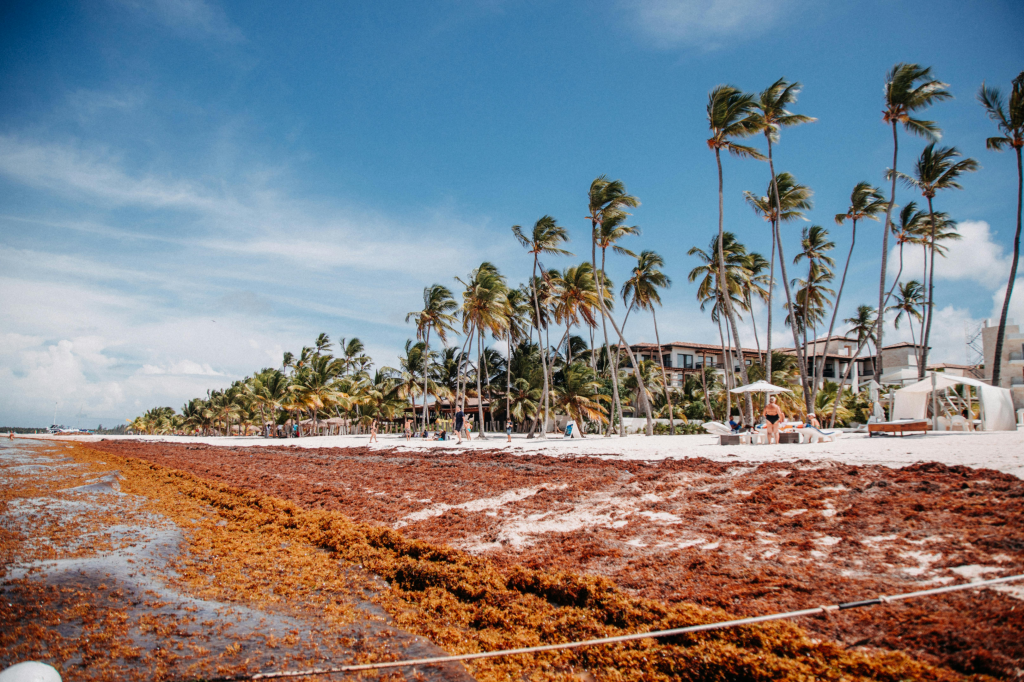
June
- Average temperature: 77 – 91°F
- Average rain: 5.41 inches, 12 rainy days avg.
- Tourism: Low
- Drawbacks: Potential sargassum, hurricane season, & high temperatures
- Popular events, holidays, & activities: n/a
June sees a rise in temperatures and a stronger probability of sargassum deposits. On top of that, it’s when rainstorms become commonplace around the coasts, meaning you can expect downpours with fair regularity. You’ll also notice a few more storms, as this is hurricane season.
But it’s not entirely bleak. June is also a time when the number of tourists plunges, meaning you’ll have almost exclusive access to dozens of experiences—from cooking classes to jungle tours to deep-sea fishing.
Plus, June is the start of the turtle season, when multiple species of sea turtles converge on Tulum. They’re snacking on sargassum and laying their eggs, giving you an unprecedented chance to rub elbows (or fins) with one of Mother Nature’s dopiest-looking reptiles.

July
- Average temperature: 77- 92°F
- Average rain: 4 inches, 12.5 rainy days avg.
- Tourism: Low
- Drawbacks: Peak season for sargassum and hurricanes, high temperatures
- Popular events, holidays, & activities: n/a
July is similar to June in terms of its drawbacks: more rain, higher temperatures, and a stronger chance of running into sargassum and tropical storms. During the summer months, Tulum (and all the Riviera Maya) becomes hot, humid, and endlessly sticky thanks to rain showers.
Hospitality takes a nose dive, which means you can find fantastic deals and low prices for lodging, tours, activities, and even local eateries. That’s particularly important in a place like Tulum. Compared to other hot spots like Cancun and Playa del Carmen, visitors tend to pay higher prices for the basics.
Along with great deals, there’s yet another silver lining. July marks the peak of sea turtle season, along with another marine favorite: whale sharks. These spotted behemoths are commonly seen around Tulum’s beaches. If you’re an aquatic animal lover who’s unafraid of algae and hurricanes, then you’ll be rewarded handsomely by visiting in July.
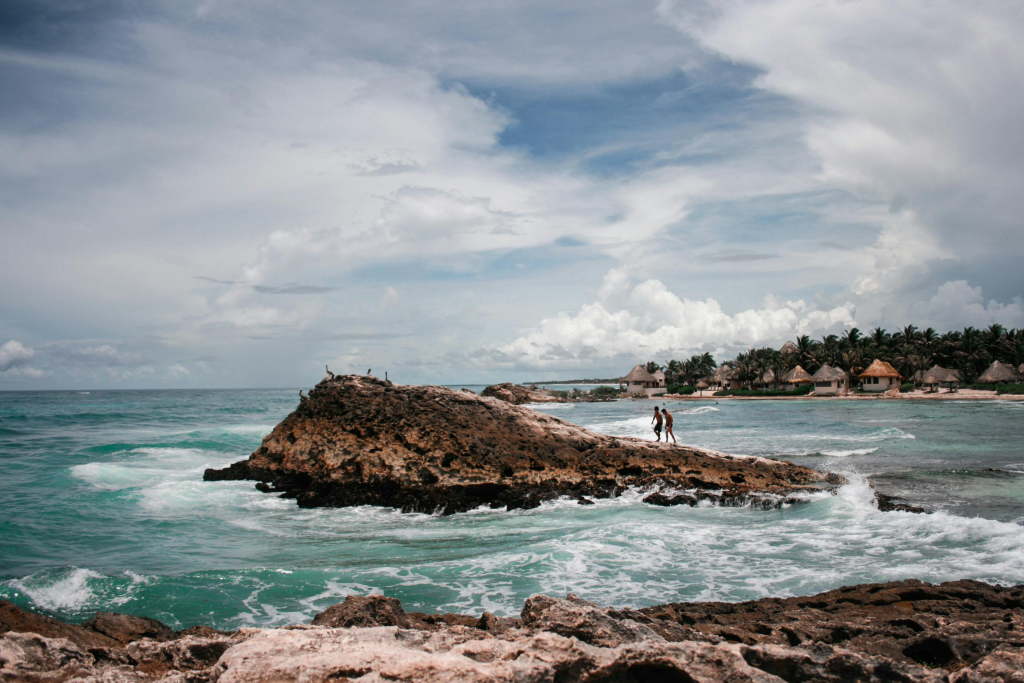
August
- Average temperature: 76 – 93°F
- Average rain: 4.3 inches, 13 rainy days avg.
- Tourism: Low
- Drawbacks: Peak of hurricane season, lots of rain, highest temperatures of the year
- Popular events, holidays, & activities: n/a
Farewell, sargassum. Hello, disgusting heat and downpours. There’s really not much to say about August in Tulum, except that you should probably try to avoid it.
Still, it’s worth pointing out that August, like July, is peak whale shark and sea turtle season. While you might run into tropical storms along the way, you’ll also be able to take advantage of tours that focus on spotting whale sharks, swimming with sea turtles, and even protecting hatcheries for baby turtles.
Oh, and the ocean will be at its warmest during this time thanks to skyrocketing temperatures. Fussy swimmers rejoice!
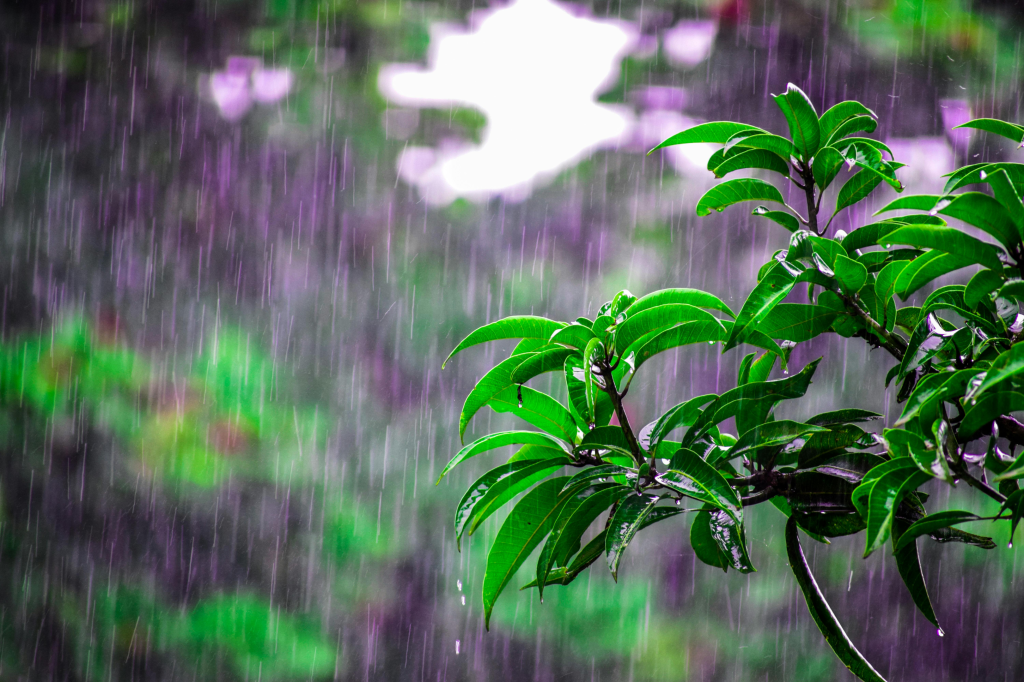
September
- Average temperature: 76 – 90°F
- Average rain: 8.85 inches, 15 rainy days avg.
- Tourism: Low
- Drawbacks: Rainiest month in Tulum, peak of hurricane season, high temperatures
- Popular events, holidays, & activities
- Mexican Independence Day (aka Día de la Independencia) On September 16, Mexico celebrates its independence from Spain. At midnight on September 15, you’ll see thousands of locals line up in downtown Tulum to ring in their independence with a battle cry. Expect mariachi music, fireworks, and plenty of jovial vibes.
September and October see the most rain. That means two things. First, you can find some of the steepest deals on hotels, adventures, and more during this time. (Seriously, they’re a steal.) Second, you need to pack an umbrella and a raincoat.
That being said, rain showers in Tulum and around the Yucatan are usually intense but short-lived. That means the skies might get cloudy preceding a heavy downpour, but they usually clear up shortly after.
And not to keep bringing up sea turtles, but September is when all those eggs laid on the beach in the summer months start hatching. Want to witness their pilgrimage into the water? That’s absolutely on the books for a September visit to Tulum. And given there are fewer tourists, you won’t be fighting for a view of the action.
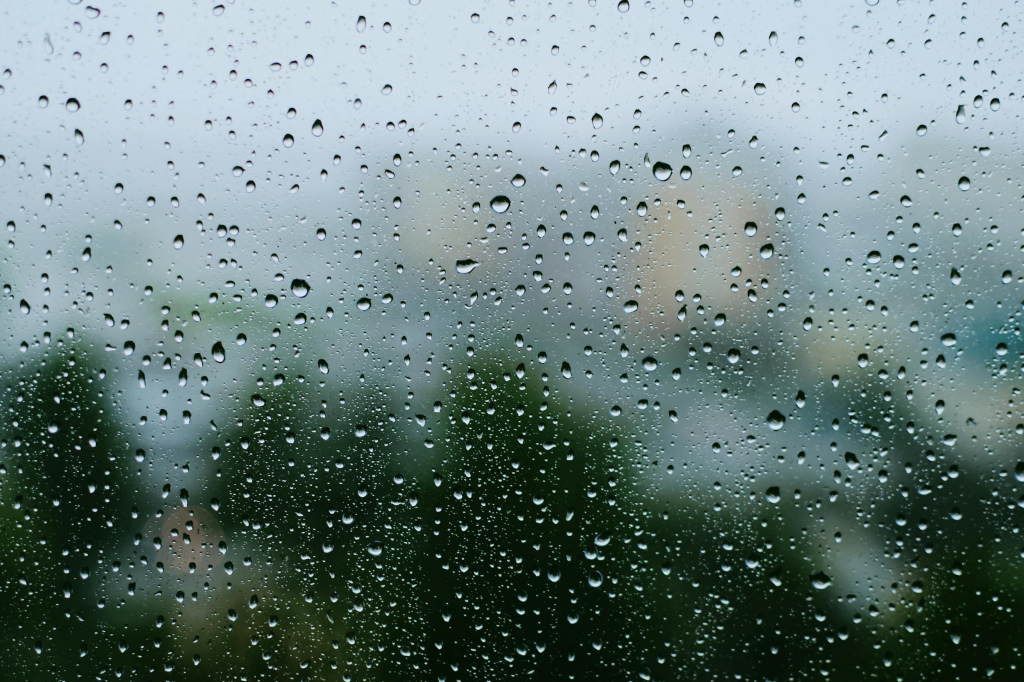
October
- Average temperature: 74 – 87°F
- Average rain: 8.7 inches, 13.5 rainy days avg.
- Tourism: Low
- Drawbacks: Hurricane season, potential sargassum reappearances, lots of rain
- Popular events, holidays, & activities: n/a
We’re at the bottom of the barrel in terms of the best time to visit Tulum. October isn’t for the faint of heart. That being said, this is a good time to point out (once more) that lounging below the sun isn’t the end-all, be-all of Tulum tourism.
The area is known for its emphasis on wellness events, yoga retreats, and multi-week health programs. If you’ve been thinking about heading to Tulum to take advantage of its New Age emphasis on spiritual, mental, and emotional well-being, then consider going in October.
The weather won’t be great, but you’ll be turning a lens inward, anyway. The same goes for visiting local Mayan ruins. Though it’s never great to explore archaeological sites mid-downpour, you won’t be waiting in lines thanks to the Yucatan turning into a ghost town at this time.
Visiting Tulum in other months
November – December

November
- Average temperature: 72 – 85°F
- Average rain: 5.2 inches, 8 rainy days avg.
- Tourism: Mid to high
- Popular events, holidays, & activities
- Day of the Dead (aka Dia de los Muertos) This holiday is all about honoring the dead. While visitors are treated to colorful performances, locals are more likely to head to the cemetery to offer their ancestors flowers and gifts, clean graves, and light candles. Once again, participate respectfully.
- Riviera Maya Jazz Festival (Playa del Carmen) This annual jazz festival is one of the longest-running musical parties on the Riviera Maya. Since 2003, it’s seen some of the world’s top jazz performers take the stage, creating a lively atmosphere.
- Horyzon Festival (Tulum) This multi-week festival brings thousands together to party through the night until the pale light of dawn grazes the sky. Mostly on beaches, sometimes in the jungle. Nice.
Say goodbye to muggy weather and humid heat, along with heavy rainfall. Say another adios to wayward tides of sargassum, sea turtles, and whale sharks.
Tourism hasn’t quite returned to dry season levels, but there’s certainly more life around Tulum Town. It’s the perfect time to visit, in my opinion.
But keep in mind that November marks the restart of the busy season. Toward the start of the month, you’ll face fewer crowds—even if prices have started to hike up again. Toward the end of the month, however, you can expect to see larger groups of visitors using their Thanksgiving vacation days.
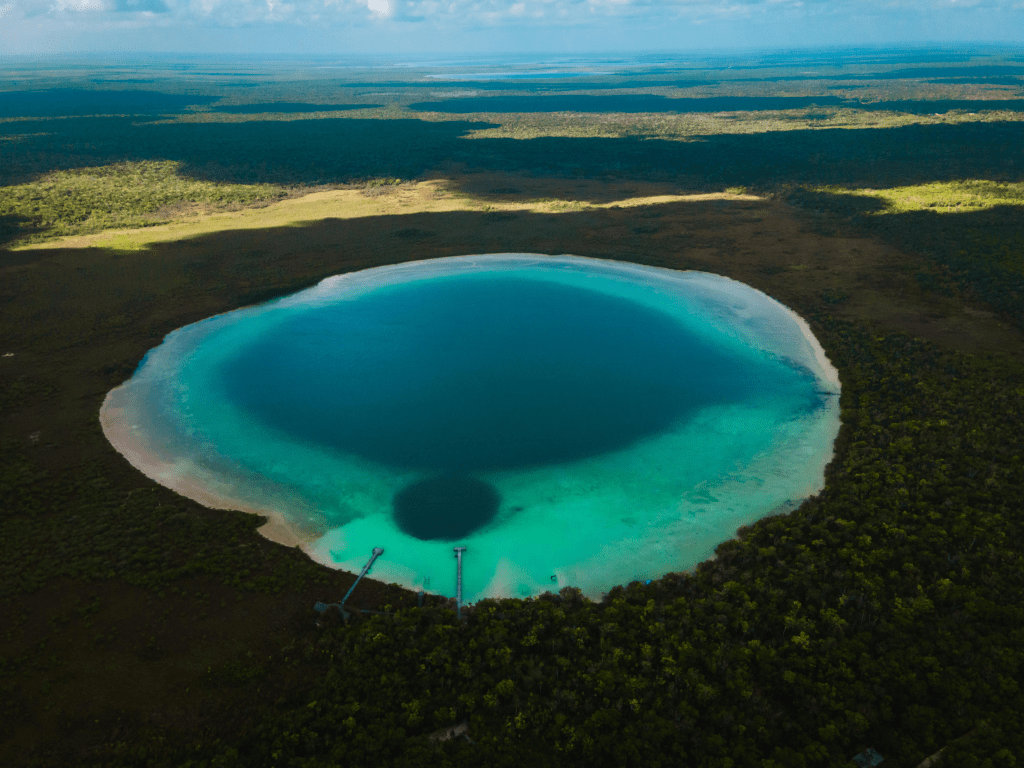
December
- Average temperature: 70 – 82°F
- Average rain: 3.77 inches, 7 rainy days avg.
- Tourism: High
- Popular events, holidays, & activities
- Zamna Festival (begins at the end of December and continues into January)
December sees a rising scale in terms of tourism. Early December tourist numbers grow from mid-season levels to high season peaks. The Christmas and New Year period at the end of the month hits all-time highs.
Anyone planning a visit during December should book their lodging and tours well ahead of time. Not only will Tulum start to fill up, but so will surrounding areas like Playa del Carmen, Cancun, and even Isla Mujeres.
During this time, you’ll notice more people hitting the beaches, as temperatures start to rise and rainfall starts to decline. As with the dry season (January-May), it’s the ideal time to enjoy beachy activities like snorkeling and surfing.
However, you’ll be paying a premium on room rates in Tulum’s hotel zone in December—especially if you want to stay in proximity to Tulum’s mega-popular New Year’s Eve party locations.
Conclusion
From unexpected rainstorms to hordes of tourists to beaches lined with sargassum, it’s worth thinking about which experiences you want to avoid in Tulum. Before booking your trip, take a look at the best time to visit Tulum.
Make sure you book your hotel and experiences ahead of time if you’re planning a trip during high season. On the other hand, you can avoid high hotel prices and big crowds if you’re okay chancing weather conditions during the off-season.
Images courtesy of Unsplash, Pexels, Zamna, and TripAdvisor
